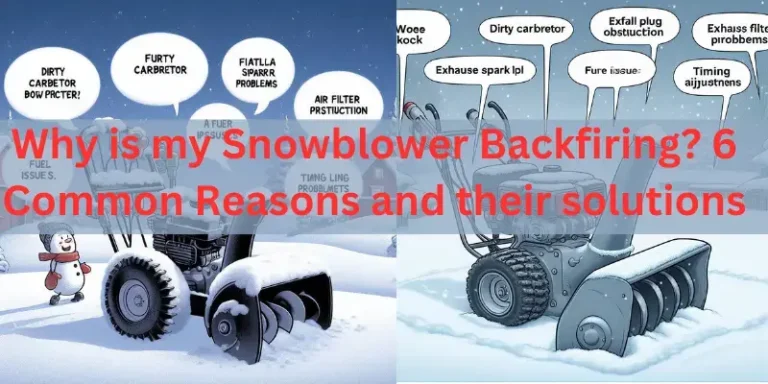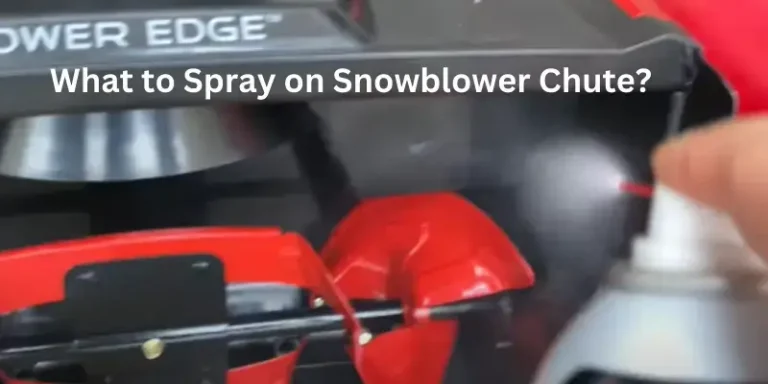Unveiling the Truth: Do Snow Blowers Have Oil Filters?
Snowblowers, the winter warriors of our driveways, demand attention when it comes to maintenance. Imagine being stranded in a snowstorm with a malfunctioning snowblower! In this blog post, I will discuss an important aspect of snowblower upkeep – the often overlooked oil filters. Join me as I explore the role of snowblower oil filters, discuss common misconceptions, and guide you through the process of maintenance.
The first question, people are curious to know “Do Snowblowers Have Oil Filters?”. As like other machines Of Course, Snow Blower also has an oil filter when it comes to the bigger model comprising combustion engine.
Understanding Snowblower Oil Filters:
To comprehend the significance of oil filters, let’s first understand their role. In essence, oil filters are the silent guardians of your snowblower engine. They sift through the oil, trapping contaminants that could otherwise wreak havoc on the engine’s delicate components.
Contrary to popular belief, not all snow blowers are equipped with oil filters. Some rely on the engine’s design and oil quality to mitigate potential damage. However, many modern snowblowers boast sophisticated engines that benefit greatly from the protection provided by oil filters.
Factors Influencing Oil Filter Usage: Discuss the Snowblower Enigma
Different Snowblowers, Different Needs:
- Not all snow blowers are the same.
- Big ones usually have filters to protect the engine.
- But smaller ones might not need them.
Engine Types Matter:
- Engines come in two types – simple ones and more complex ones
- Smaller snowblowers have simple engines and might not need filters.
- Bigger ones have complex engines that benefit from filters.
Consider How You Use It:
- Think about how much you use your snowblower.
- If you use it a lot or for tough jobs, get one with a filter.
- Doing regular care, like changing oil and filters, keeps your snowblower strong in winter.
Maintaining Your Snowblower Oil Filter
Regular oil filter replacement is key to extending your snowblower’s lifespan. A neglected filter can lead to oil contamination, diminishing engine performance and potentially causing damage to the engine.
Step-by-Step guide to replacing your snowblower’s oil filter:
Locate the Oil Filter
Refer to your snowblower’s manual to find the oil filter’s location. It’s often situated near the engine, accessible with basic tools.
Drain the Oil:
Before replacing the filter, drain the old oil to prevent spills. Follow the manufacturer’s instructions for oil disposal.
Remove the Old Filter:
Use a wrench to loosen and remove the old filter. Be prepared for some residual oil, so have a pan or rag handy.
Install the New Filter:
Apply a thin coat of oil to the rubber gasket on the new filter. Screw it in place by hand, then use the wrench to tighten it snugly.
Refill with Oil:
Pour the recommended amount of oil into the snowblower, following your manual’s guidelines.
Choosing the right oil filter is important. Refer to your snowblower’s manual or consult with the manufacturer to ensure compatibility. A mismatched filter may compromise its effectiveness.
Addressing Common Concerns: Snow Blower Oil Filters
Regular Oil Changes:
A common question lingers: “Do snowblowers without oil filters need oil changes?“
Yes, they do.
While oil filters add a layer of protection, all snowblowers need regular oil changes.
Skipping this basic care step lets contaminants build up, even in filter-free machines, and weakens the engine over time.
Consequences of Neglect:
Ignoring oil filter care can lead to serious problems.
Contaminated oil causes more friction, overheating, and faster wear on the engine.
In extreme cases, this neglect might force you into a costly engine replacement.
Troubleshooting Tips:
If your snowblower gives you trouble linked to the oil filter, quick action is essential.
Look for leaks, weird sounds, or a drop in performance.
Early spotting and fixing can save you from major damage.
How Snow Blowers Differ from Cars in Oil Filtration
Understanding the differences in oil filtration between snowblowers and cars is vital for their maintenance. While both use engines, their requirements vary greatly because of different operational contexts, engine sizes, and maintenance schedules.
Operational Environments Influence Oil Filtration
Snow blowers work in colder, more demanding conditions, affecting oil viscosity.
They need filtration systems efficient for thicker oils to prevent engine strain.
Engine Size Matters
Cars have larger engines than snowblowers, necessitating more complex oil filtration.
With smaller engines, snow blowers use simpler, yet efficient, filtration systems.
Difference in Maintenance Requirement
Snow blowers, often idle for months, require filtration systems that maintain oil cleanliness over time.
Cars are used more regularly and need systems designed for frequent oil changes and continuous use.
Key Takeaways
Operational Environments: Snow blowers operate in colder climates, requiring systems that can handle thicker oils.
Engine Size: The smaller engines of snow blowers mean their oil filtration systems can be less complex than those in cars.
Maintenance Needs: The seasonal use of snow blowers versus the daily use of cars influences the design and functionality of their oil filtration systems.
(Frequently Ask Questions)FAQs
Final Thoughts:
Understanding the role of oil filters in snowblowers is paramount to ensuring their long life and optimal performance. Regular maintenance, including proper oil filter replacement, is a small investment that pays off in the long run. As winter approaches, take the time to inspect your snowblower’s oil filter status and follow the recommended maintenance schedule. Your snowblower will thank you with reliable service during the harshest winter days.

About Naveed A Hashmi
In my childhood, I used to see my parents while working in the land, for these reasons today I have been serving the same as our own tradition and culture. I thus love to stay in it, because I want to learn something advanced and new so that I may improve my farm’s contour and help others with my experience.







